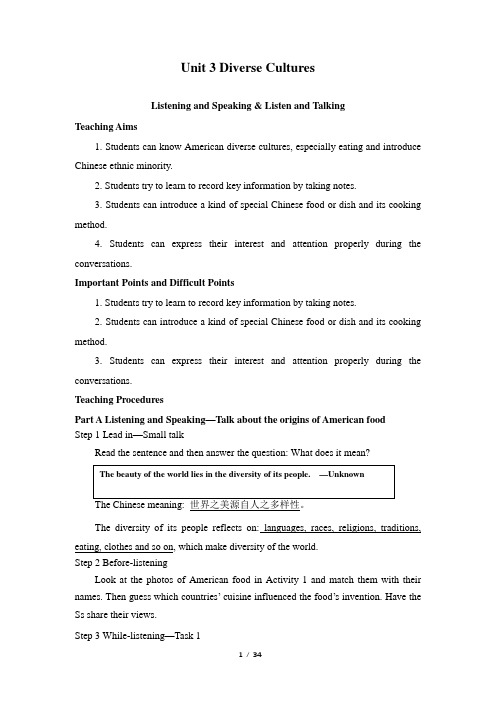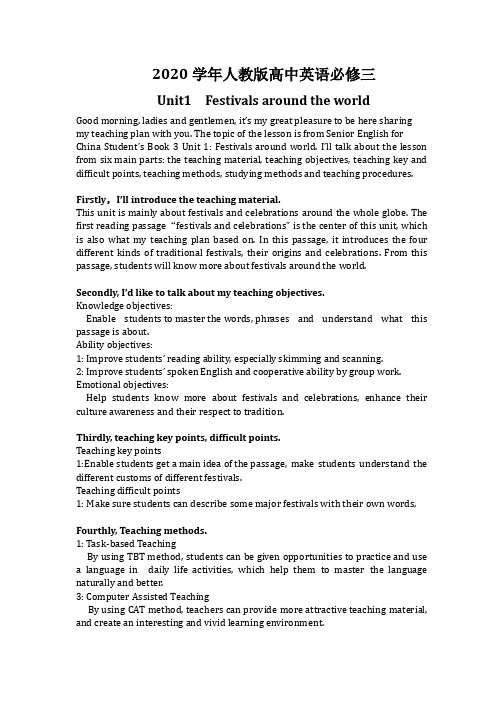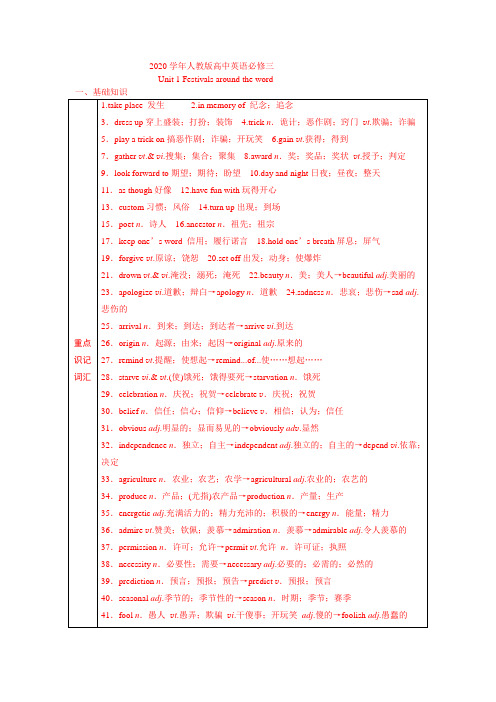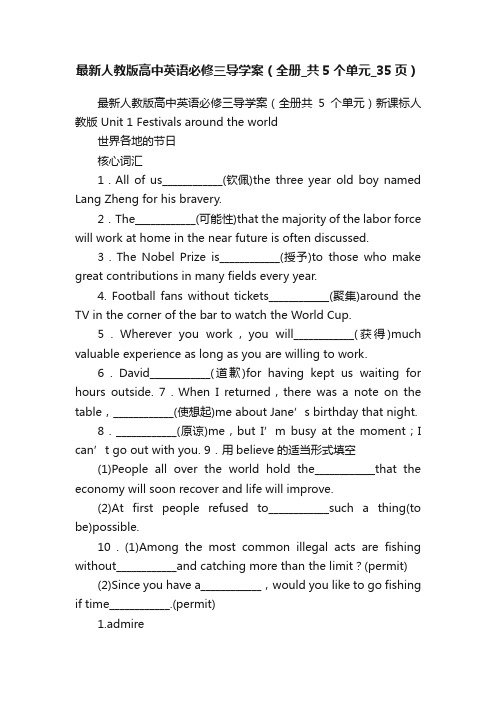2020学年人教版高中英语必修三Unit1语法导学案
2020年新人教版必修三《Unit 3 Diverse Cultures》单元教案(附导学案)1

Unit 3 Diverse CulturesListening and Speaking & Listen and TalkingTeaching Aims1. Students can know American diverse cultures, especially eating and introduce Chinese ethnic minority.2. Students try to learn to record key information by taking notes.3. Students can introduce a kind of special Chinese food or dish and its cooking method.4. Students can express their interest and attention properly during the conversations.Important Points and Difficult Points1. Students try to learn to record key information by taking notes.2. Students can introduce a kind of special Chinese food or dish and its cooking method.3. Students can express their interest and attention properly during the conversations.Teaching ProceduresPart A Listening and Speaking—Talk about the origins of American foodStep 1 Lead in—Small talkRead the sentence and then answer the question: What does it mean?The Chinese meaning: 世界之美源自人之多样性。
2020年人教版高中英语必修三unit1reading 说课稿

2020学年人教版高中英语必修三Unit1 Festivals around the worldGood morning, ladies and gentlemen, it’s my great pleasure to be here sharing my teaching plan with you. The topic of the lesson is from Senior English for China Student’s Book 3 Unit 1: Festivals around world. I’ll talk about the lesson from six main parts: the teaching material, teaching objectives, teaching key and difficult points, teaching methods, studying methods and teaching procedures. Firstly,I’ll introduce the teaching material.This unit is mainly about festivals and celebrations around the whole globe. The first reading passage“festivals and celebrations” is the center of this unit, which is also what my teaching plan based on. In this passage, it introduces the four different kinds of traditional festivals, their origins and celebrations. From this passage, students will know more about festivals around the world. Secondly, I’d like to talk about my teaching objectives.Knowledge objectives:Enable students to master the words, phrases and understand what this passage is about.Ability objectives:1: Improve students’ reading ability, especially skimming and scanning.2: Improve students’ spoken English and cooperative ability by group work. Emotional objectives:Help students know more about festivals and celebrations, enhance their culture awareness and their respect to tradition.Thirdly, teaching key points, difficult points.Teaching key points1:Enable students get a main idea of the passage, make students understand the different customs of different festivals.Teaching difficult points1: Make sure students can describe some major festivals with their own words, Fourthly, Teaching methods.1: Task-based TeachingBy using TBT method, students can be given opportunities to practice and use a language in daily life activities, which help them to master the language naturally and better.3: Computer Assisted TeachingBy using CAT method, teachers can provide more attractive teaching material, and create an interesting and vivid learning environment.Fifthly, studying methods.1: Task-based learning.2: Cooperative learningSixthly, Teaching procedures.1: Lead-inShow students a short video some traditional festivals’ celebrations. After watching that, ask students questions like “have you ever had these festivals?” “what do you do at these festivals?” “how do you know about these festivals?”Justification: in the beginning of the class, I want to use online video to create a lively environment in which students can get involved in more quickly, and also activate students interest and background knowledge of the topic.2: While-reading.Task 1 SkimmingDivide students into 8 groups, give them 3 minutes to glance over the title and each paragraph, then try to discuss and sum up the main idea of each and the theme of the whole passage.Justification: practice students’ ability of reading for the general idea, moreover, by group disc ussion, turn passive study to active study, and enhance students’ spoken English and the consciousness of cooperative learning.Task 2 ScanningGive students 8 minutes to read the passage carefully, then ask them questions like:1, what festivals are held to honour the dead and ancestors?2, who is honoured in India in October 2?3, what do European people do to celebrate harvest?4, what festivals are celebrated in Spring?Justification: practice students’ ability of reading for specific information. And also, by answering those questions students can have a better understanding of festivals around the world.3: Post-reading.Divide students into 8 groups, ask students to find out and discuss all the festivals and celebrations mentioned in the passage. After that, each group sends a representative to describe two festivals in front of the whole class. Justification: deepen students’ knowledge of today’s class. Make sure students can talk about festivals and celebrations by using their own words. Encourage students to express themselves in the face of people and to cooperate with others.4: Consolidation.Ask students to review the passage very quickly then complete the exercise below.Justification: review and consolidate the knowledge we’ve just learnt.5: Homework.Write an essay to introduce a festival and how it is celebrated.Justification: this activity does not only strengthen students’ understanding of different kinds of festivals and celebrations, but also improve students’ interculture awareness.。
2020年新人教版必修三《Unit 3 Diverse Cultures》单元教案(附导学案)1

Unit 3 Diverse CulturesListening and Speaking & Listen and TalkingTeaching Aims1. Students can know American diverse cultures, especially eating and introduce Chinese ethnic minority.2. Students try to learn to record key information by taking notes.3. Students can introduce a kind of special Chinese food or dish and its cooking method.4. Students can express their interest and attention properly during the conversations.Important Points and Difficult Points1. Students try to learn to record key information by taking notes.2. Students can introduce a kind of special Chinese food or dish and its cooking method.3. Students can express their interest and attention properly during the conversations.Teaching ProceduresPart A Listening and Speaking—Talk about the origins of American foodStep 1 Lead in—Small talkRead the sentence and then answer the question: What does it mean?The Chinese meaning: 世界之美源自人之多样性。
2020年新人教版必修三《Unit 1 Festivals and Celebrations》单元教案(附导学案)1

Unit 1 Festivals and CelebrationsListening and speaking & Listening and talking【教材分析】本板块的活动主题是“谈论节日活动”(Talk about festival activities),主要是从贴近学生日常生活的角度来切入“节日”主题。
学生会听到发生在三个国家不同节日场景下的简短对话,对话中的人们正在参与或将要亲历不同的庆祝活动。
随着全球化的进程加速,国际交流日益频繁,无论是国人走出国门还是外国友人访问中国,都已成为司空见惯的事情。
因此,该板块所选取的三个典型节日场景都是属于跨文化交际语境,不仅每组对话中的人物来自不同的文化背景,对话者的身份和关系也不尽相同。
【教学目标】1. Master the new words related to holiday: lantern, carnival, costume, dress (sb) up, march, congratulation, congratulate, riddle, ceremony, samba, make-up, after all.2. To understand the origin of major world festivals and the activities held to celebrate them and the significance of these activities;3. Improve listening comprehension and oral expression of the topic by listening and talking about traditional festivals around the world;4. Improve students’ understanding of the topic by watching pictures and videos about different traditional festivals around the world;5. Review the common assimilation phenomenon in English phonetics, distinguish the assimilated phonemes in the natural language flow, and consciously use the assimilation skill in oral expression.【教学重难点】Importance:1. Guide students to pay attention to the attitude of the speaker in the process of listening, and identify the relationship between the characters;2. Inspire students to use topic words to describe the festival activities based on their background knowledge.Difficulties:In the process of listening to the correct understanding of the speaker’s attitude, accurately identify the relationship between the characters.【课前准备】1. To understand the origin of traditional festivals in the world, the celebration activities (customs) of these festivals and the meaning of these activities;2. Talk about holiday celebrations;3. Preview: understand the new words according to the context.【教学过程】Step 1 Lead-inTeachers talk about the world’s traditional festivals, such as the Lantern Festival in China, adults’ day in foreign countries, carnivals and so on.Step 2 Watching and talkingActivity 11. Teacher lets Ss look at some pictures about festival activities. During talking about these activities, teacher can add some background knowledge about festivals.Questions:①What festivals do the pictures show us?②In which country do you think people celebrate each festival?③How do people celebrate each festival?2. Ask sb to choose some words or phrases from the box to celebrate eachfestival.3. Teacher can show students how to use these word blocks and learn to describeholiday activities in groups. For example:On the Coming-of-Age Day, young girls in Japan would wear traditional costumes.One of the most important activities during the Lantern Festival is to guess riddles.During the Rio Carnival, you can watch wonderful samba dances.4. The teacher asks students to report the results of the group lecture. Ask thesequestions:①What do people do to celebrate the Chinese Lantern festival?②Who will celebrate Coming-of-Age Day? What do they do to celebrate it?③What do you expect to see if you go to the Rio Carnival?5. Learn some words and phrases in the box.Step 3 ListeningActivity 21. Teacher asks sb to read “Listen for relationships”, In pairs, discuss how to identify relationships between people based on their tone and content. The teacher can provide the following questions to inspire students to discuss.①What does a tour guide usually say to a tour group? What expressions arefrequently used?②What questions does an interviewer usually ask during an interview?③What would a reporter say or do if he/she wants to interview a tourist?④How do friends usually talk?2. Some group representatives are invited to communicate and speak in class.3. Teacher plays the listening tape for students to listen to and write the order of the conversations next to the names of the festivals.4. Play the tape again, students match each conversation with the relationship between the speakers.5. Check the answers with class.Activities 3-41. Teacher asks students to look at the tasks and requirements of activity 3. Then read the main ideas of the three dialogues. (Guide the students to guess and fill in the words according to the context. Let the students analyze the English syntactic structure based on the meaning of the sentence and make reasonable inferences.)2. Teacher plays the tape for the second time. After listening to the tape, students discuss the answers in pairs. Then the class communicates and checks the answers.3. Teacher lets students listen to the tape for the third time (Before the teacher plays the recording for the third time, the teacher should prepare the students to takenotes and remind them to catch key words, especially phrasal verbs.).Step 4 SpeakingActivity 51. Lead the dialogue by asking questions. Let students understand how to discuss their favorite festivals and give their reasons.E.g.,Conversation 1T: Which of the three festivals do you like best?S1: I think the Coming-of-Age Day is the most interesting.T: Why is it your favourite?S1: Because I like to see women dressed up in their colorful traditional kimonos.Conversation 2T: Which of the three festivals attracts you most?S2: The Chinese Lantern Festival.T: I suppose you like yuanxiao, the sweet dumplings.S2: Not only that. I especially like guessing riddles and I’m good at it.2. Follow the example of the conversation in activity 5 and work in pairs to discuss your favorite holiday and explain why. After the discussion, the teacher asks some groups to show the dialogue.Step 5 ActingOne student plays the role of a journalist. The other three students play the roles of the characters in the listening dialogue. They are the Japanese girl attending the coming-of-age ceremony, the girl attending the Rio carnival, and the tourist visiting China. The following questions can be used in the interview:①What is the purpose of this festival?②How do you usually celebrate this festival?③What do you like best about this festival?Step 6 Pronunciation1. Help students recognize speech assimilation.(1)Teacher plays the recording of activity 1 and asks the students to pay attention to the pronunciation changes of bold letters while listening.(2)Teacher organizes students to carry out activities in pairs: the teacher plays the recording, one person in the group reads after the words and phrases in activity 1, the other person compares the pronunciation of the recording with that of his partner carefully, and points out the pronunciation problem of his/her partner if there is any difference. Then switch roles, listen to the tape again and complete the same task.2. Let students imitate and read.(1)Teacher guides students to understand the requirements of activity 2. Before listening to the tape, the teacher asks the question for students to think: “How does your pronunciation change while reading the sentences?”(2)Teacher plays the tape for the first time. The students read after the sentences in activity 2.(3)Teacher plays the tape for the second time, the students repeat the sentences again, and then discuss with their partners the differences between the pronunciation of the bold consonants in words and the pronunciation in sentences, and describe the phonetic assimilation in the flow.(4)Teacher asks different students to read the six sentences of activity 2 and report the result of the discussion on phonetic assimilation. The teacher supplements and corrects the students’conclusion, explains it appropriately, and writes the assimilation pronunciation in these sentences on the blackboard or presents it to the students through the courseware.Step 7 Listening and TalkingActivity 61. Learn the new words about the festivals.2. Look at the pictures and predict what festival Song Lin and Max are going to talk about.3. Listen and answer the questions.①What festival is Max talking about?②What did Max’s mother cook?③What did Max do during the festival?④What did Max and his family do during and after the dinner?⑤What was the best part of the festival?4. Listen again and check the answers with class.Answers:①Christmas experiences.②Roast turkey, mashed potatoes and Christmas pudding, …③He helped decorate the Christmas tree and put presents under it, then helped his mum prepare for the family dinner.④During dinner they shared stories and told jokes, afterwards they played games, opened their presents.⑤The best part was opening their presents on Christmas morning.5. Listen again and tick the phrases that Max or Song Lin uses. Then check the answers with class.6. Have a conversation with the help of these questions:①What is the recent festival you have had?②How did you celebrate it?③How do you feel about the festival? Why?Step 8 Homework1)Read the passage again and understand the food culture from a cross-cultural perspective.2)Remember the new words and learn the usages of them.【教学反思】1、通过本节内容学习,学生能否理解发生在三个国家不同节日场景下的简短对话,对话中的人们正在参与或将要亲历不同的庆祝活动;2、通过本节内容学习,学生能否辨别对话中人物之间的关系;3、通过本节内容学习,学生能否掌握听力训练中的听力策略。
高中英语必修三unit1教案

高中英语必修三unit1教案教案标题:高中英语必修三Unit 1教案教学目标:1. 了解并掌握Unit 1中的重点词汇、短语和句型;2. 能够运用所学知识描述人物特征和外貌;3. 能够运用所学知识进行听说读写的综合训练;4. 培养学生的合作意识和团队合作能力。
教学重点:1. 掌握重点词汇、短语和句型;2. 运用所学知识进行听说读写的综合训练。
教学难点:1. 运用所学知识进行听说读写的综合训练。
教学准备:1. 教材:高中英语必修三教材Unit 1;2. 多媒体设备;3. 教学课件;4. 学生练习册。
教学过程:Step 1: 导入新课1. 利用多媒体设备播放一段关于人物特征和外貌的视频或展示一些图片,激发学生对话题的兴趣;2. 引导学生讨论所展示的人物特征和外貌,并引出相关的词汇。
Step 2: 词汇学习1. 教师呈现并讲解Unit 1中的重点词汇,包括形容词、名词和动词;2. 学生跟读并模仿教师的发音;3. 学生进行词汇拓展活动,如根据给出的词根或词缀构造新词。
Step 3: 句型学习1. 教师呈现并讲解Unit 1中的重点句型,包括描述人物特征和外貌的句型;2. 学生进行句型操练活动,如根据给出的句子结构进行句子变换。
Step 4: 听说读写综合训练1. 教师设计听力活动,如听力填空或听力选择题,让学生通过听力理解并掌握所学知识;2. 学生进行口语练习,如两人一组描述对方的外貌特征;3. 学生进行阅读活动,如阅读课文并回答相关问题;4. 学生进行写作活动,如根据所给的人物描述写一篇短文。
Step 5: 合作学习1. 学生分组进行合作学习,如小组讨论和合作完成一些任务;2. 教师进行指导和辅导,鼓励学生积极参与合作学习。
Step 6: 总结和评价1. 教师对本节课的教学进行总结,强调重点和难点;2. 学生进行自我评价,反思自己在本节课中的学习情况和问题。
Step 7: 作业布置1. 布置课后作业,如完成练习册上的相关练习;2. 鼓励学生积极参加课外阅读,拓展自己的词汇和语言能力。
高一英语英语必修三Unit1导学案及练习题

高一英语英语必修三Unit1导学案及练习题本资料为woRD文档,请点击下载地址下载全文下载地址www.5ykj.com 第1课时Talkaboutfestivals:sometraditionalchineseFestivalsSpringFestival春节QingmingFestival清明节DoubleNinthFestival重阳节DoubleSeventhFestival七夕节mid-AutumnFestival中秋节LanternFestival元宵节(TheyuanxiaoFestival)DragonBoatFestival端午节*Festivalsaremeanttocelebrateimportantevents.*what’syourfavoriteholidayoftheyear?*whatfestivalsorcelebrationsdoyouenjoyinyourcityortown?*Doyoulikespendingfestivalswithyourfamilyorwithyour friends?*whatpartofafestivaldoyoulikebest——themusic,thethingstosee,thevisitorthefood?*Festivalsandcelebrationsofallkindsareheldeverywher e.*Theylitfiresandmademusicbecausetheythoughtthesefes tivalswouldbringayearofplenty.*Somefestivalsareheldtohonorthedeadorsatisfyandplea setheancestors.*Festivalscanbeheldasanhonortofamouspeopleorthegods.*Themostenergeticandimportantfestivalsaretheonestha tlookforwardtotheendofwinterandtothecomingofspring.*Festivalsletusenjoylife,beproudofourcustomsandforg etourdailylifeforalittlewhile.第2课时【自主学习】单词预习学案.庆典,庆祝n._________v.__________庆祝严寒的结束__________________________,________________2.起源,由来n._________HermotherisFrench__________宗教n._________adj._______宗教信仰__________3.到达n.________v._____________幸存,生还n._____________v.____________4.独立n.____________adj.___________从英国人那儿获得独立______________5.盼望春节的到来______________________________Specialattentionshouldbepaidto__________thewords.6.与家人玩得开心_________取笑某人,拿某人开玩笑___________Ididit_____________搞某人的恶作剧____________7.必要性,需要;必需品n._____必需的adj._______生活必需品______8.守信用,履行诺言_____________________食言____________9.道歉v.__________n.___________因某事向某人道歉__________Pleaseacceptmy______________forthatmeto___________tothatfellow?Noway!He_________________forsteppingonmyfoot.0.淹没,溺死v.__________pt___________pp____________adrowningman_____________adrownedbody_____________drownoneselfinwork__________drownone’ssadnessinwine__________1.哭泣,流泪v._____________pt___________pp_________He______________hisfailure.扫v._________________pt._____________pp._________________【合作探究】2.用dress,clothes,clothing,cloth适当形式填空)The________needwashing,canyouhave_______washed?2)Theshopsellschildren’s___________only.3)Pleasecoverthetablewitha___________.4)____________________________5)Peopleareexpectedtowearformal__________inawedding.3.inmemoryof;incelebrationof;inhonourof;intheshapeo f,insearchof填空)Theboyswent_________________somethingtoeat.2)Hewroteapoem_________________hiswife.3).manypeoplejoinedthem______________4).Peopleeatfood_________skullsonfestivalofthedead.5)Aceremonywasheld_______________thosekilledintheea rthquake【当堂检测】)Thegreatflood_________________________manyvill ages.那次大洪水把许多村子都淹没了。
2020学年人教版高中英语必修三Unit1知识点归纳总结

2020学年人教版高中英语必修三Unit 1 Festivals around the word二、重点单词突破1 satisfy v.使满意,使满足;满足(需求、需要等)[应试指导]写作高分句式:What satisfied sb.is that...替换to one’s satisfaction他对赢得比赛感到满意。
[夯实基础](1)用satisfy的适当形式填空①None of these is particularly satisfying.②We are not satisfied with these results.③Both sides expressed satisfaction with the progress so far.④We just can’t find enough good second-hand cars to satisfy demands.⑤From his satisfied voice on the phone I know everything is going under way.(2)The teacher was satisfied with his test results and praised him.Satisfied with his test results,the teacher praised him.(用过去分词作状语改写句子)2dress v.给……穿衣;穿着;打扮;n.衣裙;女装;衣服[应试指导]过去分词作定语、状语的考查休穿戴整洁地上班去了。
The boys were all dressed up as pirates.这些男孩子都装扮成了海盗。
[词义辨析]wear,have on,dress,put on(1)wear和have on表示“穿着”的状态,wear同时表示“佩戴”,并可以用于进行时,后还可以跟表示颜色的名词,而have on不行。
最新人教版高中英语必修三导学案(全册_共5个单元_35页)

最新人教版高中英语必修三导学案(全册_共5个单元_35页)最新人教版高中英语必修三导学案(全册共5个单元)新课标人教版 Unit 1 Festivals around the world世界各地的节日核心词汇1.All of us____________(钦佩)the three year old boy named Lang Zheng for his bravery.2.The____________(可能性)that the majority of the labor force will work at home in the near future is often discussed.3.The Nobel Prize is____________(授予)to those who make great contributions in many fields every year.4. Football fans without tickets____________(聚集)around the TV in the corner of the bar to watch the World Cup.5.Wherever you work,you will____________(获得)much valuable experience as long as you are willing to work.6.David____________(道歉)for having kept us waiting for hours outside. 7.When I returned,there was a note on the table,____________(使想起)me about Jane’s birthday that night.8.____________(原谅)me,but I’m busy at the moment;I can’t go out with you. 9.用believe的适当形式填空(1)People all over the world hold the____________that the economy will soon recover and life will improve.(2)At first people refused to____________such a thing(to be)possible.10.(1)Among the most common illegal acts are fishing without____________and catching more than the limit?(permit)(2)Since you have a____________,would you like to go fishing if time____________.(permit)1.admire2.possibility3.awarded4.gathered5.gain6.apologized7.reminding8.Forgive9.(1)beliefssion (2)believe10.(1)permission (2)permit;permits高频短语1.________________ 发生2.________________ 纪念;追念3.________________ 盛装;打扮;装饰4.________________ 搞恶作剧;诈骗;开玩笑5.________________ 期望;期待;盼望6.________________ 日夜;昼夜;整天7.________________ 好像8.________________ 玩得开心9.________________ 出现;到场10.________________ 守信用;履行诺言11.________________ 屏息;屏气12.________________ 出发;动身;使爆炸13.________________ 使……想起……1.take place 2.in memory of 3.dress up 4.play a trick on 5.look forward to 6.day and night 7.as though 8.have fun with 9.turn up 10.keep one’s word 11.hold one’s breath 12.set off 13.remind...of...重点句式1.At that time people would starve if food____________,especially during the cold winter months.在当时,如果食物难以找到,人们就会挨饿,特别是在寒冷的冬季。
- 1、下载文档前请自行甄别文档内容的完整性,平台不提供额外的编辑、内容补充、找答案等附加服务。
- 2、"仅部分预览"的文档,不可在线预览部分如存在完整性等问题,可反馈申请退款(可完整预览的文档不适用该条件!)。
- 3、如文档侵犯您的权益,请联系客服反馈,我们会尽快为您处理(人工客服工作时间:9:00-18:30)。
2020学年人教版高中英语必修三Unit1 Festivals around the worldGrammar——The usage of Modal Verbs编写人: 审核:全体英语组编写时间:【学习目标】学习情态动词的用法:——can\could, may\might, will\would, shall\should, must\can’t 【学习重点】掌握并使用情态动词【学习难点】如何在不同的语境中学会使用不同的情态动词【学法指导】①注意仔细观察所给例句的结构②通过反复练习掌握掌握其用法Learning Procedures:Step1 Lead-inEnjoy a song again and again, and then fill in the blanks using the proper model verbs.I want to be with youThere are things that be done That are not yet begunThings that I doWhen I want to be with youAlthough we be far apart You be with be in my heart No one else doI just want to be with youI want to be with youyou hear me?I need you near meI want to be with you I need you near me, my loveThe two of us be one Mother of my sonNo one else doI just want to be with youI want to be with you_____ you hear me?I need you near meI want to be with youI need you near me, my loveStep2 What is Modal Verb?1.定义:情态动词本身有一定的意义,表示说话人的某种感情或语气,对某动作或状态的某种态度,表示“需要”,“可以”,“必须”,“应当”等意义。
【观察思考】Translate the following sentences into Chinese and pay attetion to the meaning of Modal Verbs.①You can smoke in the room. 你可以在房间吸烟②You must arrive on time. 你必须按时到达③We should obey the rules. 我们应该遵守规则2.基本特点:由以上例句看出:①情态动词本身都有一定的词义;②情态动词不能单独在句中充当谓语,必须和实义动词连用;③情态动词没有人称和数的变化;④情态动词后接动词原形。
Step3 The usage of modal verbs——can\could, may\might, will\would, shall\should, must\can’t【学前准备】Learn the following words about the functions(功能) of modal verbs.ability,advice,agreement,guessing,past habit,request,necessity,permission,possibility,prediction,promise, wish, willingness, determination1.can\could【观察思考1】①Can you speak Japanese?你能讲日语吗?此句中can表示能力(ability).②——Can/ Could I go now? 我可以出去吗?——You can go now, but he can’t.你现在能出去,但是他不能。
此句中can表示请求(request), 许可(permission).③It can be quite cold here in winter. 冬天这儿可能会相当冷。
此句中can表示可能性(possibility).④Someone is coming! Who can it be? 有人来! 可能是谁呢?此句中can表示推测(guessing).【自我探究1】从以上例句看出can 表示能力,请求,许可,表示理论或习惯上的可能性,推测。
注意:could可表示能力或可能性,多用于过去。
2.may\might【观察思考2】①——May/Might I ask you a question? 我可以问你一个问题吗?——Yes, you may. / Yes, you can. 是的,你可以。
此句中may\might表示请求(request), 许可(permission).②I may be busy from tomorrow on. 从明天起我可能会忙起来。
此句中may表示可能性(possibility).【自我探究2】从以上例句看出may\might 表示请求,许可, 可能性.3.will\would【观察思考3】①Would you pass me the book? 你可以给我递一下书吗?此句中would表示请求(request)。
②Go where you will. 去你想去的地方。
此句中will表示意愿(willingness)。
③When he was a child, he would often go skiing. 当他是个孩子的时候,他常去滑雪。
此句中would表示过去的习惯(past habit)。
【自我探究3】从以上例句看出will\would 表示请求,意愿,(例1, 2, )其中would 还可以表示过去的习惯(例3),相当于used to do sth.。
4. shall\should【观察思考4】①Shall we go out and have a picnic? 我们可以去外面野餐吗?②When shall he be able to leave the hospital? 他什么时候能离开医院?③You shall fail if you don’t work harder.如果你不努力学习你就会失败。
④He shall have the book when I finish reading. 我把书读完了他就可以读了。
【自我探究4】根据例①,例②,shall用于第一、三人称,表征求对方意见或请示(advice,request),用于疑问句中。
根据例③、例④shall用于第二、三人称,表说话人的命令、警告(order, warning)等强烈意志和决心。
【观察思考5】①You should go to the class right now. 你应该马上去班上。
②I’m on the bus. I should be back in five minutes.我现在在公车上。
大概5分钟之内到家。
【自我探究5】由例1可以看出should表示建议(advice),意为应该,由例2可以看出should还可表示预测(prediction),意为大概、估计。
5. must\can’t【观察思考6】①Everybody must obey the law. 每个人都必须遵守法律。
②Listen! The rat must be biting the wall. Now There must be a hole in the wall.听!老鼠一定在咬墙。
现在墙上一定有个洞。
③You mustn’t drive so fast in the street. 你千万不要在街上开得太快。
④Jack can’t be doing his homework, because I saw him go out.杰克不可能在做他的家庭作业,因为我看到他出去了。
【自我探究6】①must的意思是必须(necessity) (例1);②must表有把握的推测(guessing),意思是一定。
(例2)③mustn’t的意思是千万不要。
(例3)④must表示猜测, 否定式是can’t 或couldn’t.(例4)【针对训练】Task1: Read the text on page1 and find out the sentences using the Model Verbs.And then discuss how the model verb is being used.1) The most ancient festival the end of cold weather ,……...最古老的节日总是庆祝严寒的结束……….2) Some festivals are held to honour the dead or to satisfy the ancestor, whomight return either to help or to do harm .有些节日,是为了纪念死者,或者使祖先得到满足,因为祖先们有可能回到世上(给人们)提供帮助,也有可能带来危害。
3) For the Japanese festival Obon, people should go to clean gravesand light incense in memory of their ancestors.有日本的盂兰盆节,人们要扫墓、烧香,以缅怀祖先。
4) They also light lamps and play music because they think that this will lead theancestors back to earth .他们也点起灯笼,奏响乐曲,因为他们认为这样可以把祖先引回到世上。
5) Festivals can alse be held to honor famous people .有些节日也可以是纪念名人的。
6) Harvest and Thanksgiving festivals can be very happy events .收获节和感恩节是非常喜庆的节日。
7) Some people might win awards for their farm produce , like the biggestwatermelon or the most handsome rooster.有些人可能因为他们的农产品而获奖,比如最大的西瓜或最帅的雄鸡。
